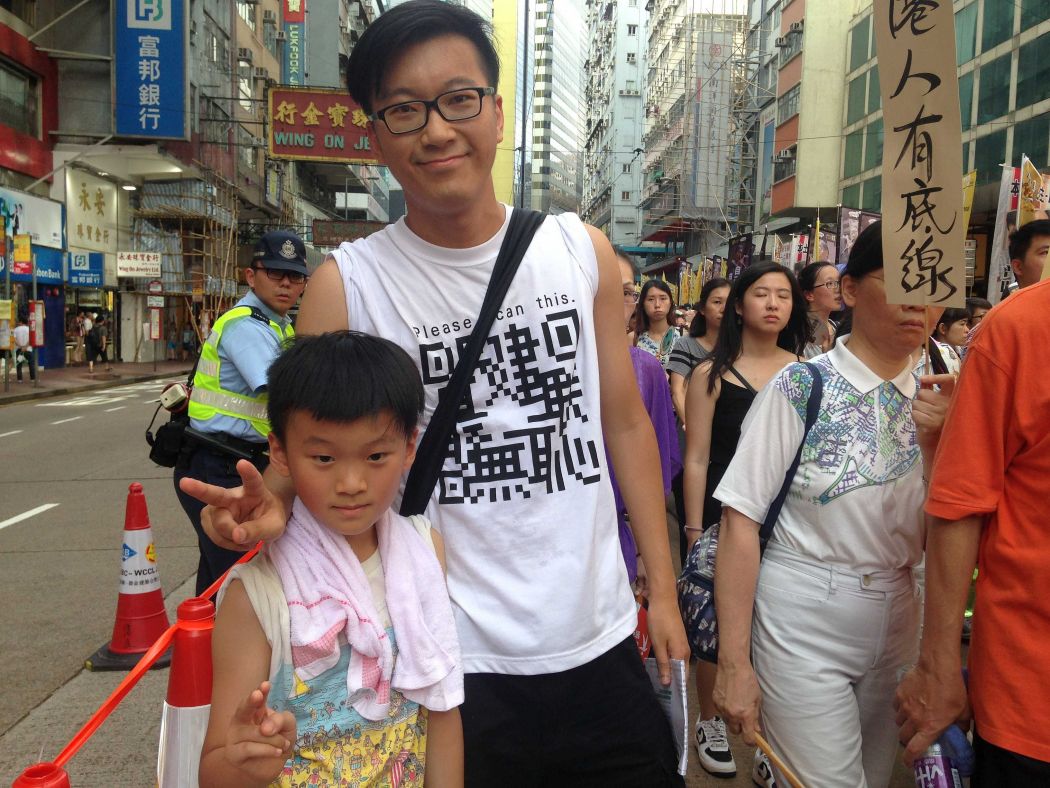Friday’s pro-democracy rally on the 19th anniversary of Hong Kong’s handover from British rule is an educational experience, parents said at the march.
Police estimated the turnout at this year’s annual July 1 protest to be 19,300 at the height of the rally, though organisers said 110,000 took part – double last year’s figure of 48,000.

‘Independent thought’
Paul Ting, an engineer who was there with his wife and 9-year-old. He had been inviting his son to the march for years. This time, he was finally willing to come as he had learned about some of the issues at school, Ting said.
Ting added that it was important because they get tested in school on these topics: “I want to let him experience it, like a lesson.” The history taught in schools is lacking, so parents need to fill in the blanks, he said.
“It’s boring,” said Ting’s son, when asked how he felt before the march.
“He doesn’t know what’s going on,” said Ting, as his son asked him for snacks. “It’s his first time – it’ll be fresh for him. I want him to use his own process to think about: what are these people doing? I don’t want to give him a concept of whether it’s right or wrong… I want to train him to have independent thought, not to look at things superficially, to think carefully before doing something.”

‘I hate Leung Chun-ying’
Ringo Kan, a designer who has brought his eight year-old son to the annual march since he was two, rattled off a checklist of reasons why he is angry with the government, with mainlandization foremost among them.
“As a parent, I need to let him know what’s going on in Hong Kong,” said Kan.
When asked why he was at the march, Kan’s son said: “Because I hate Leung Chun-ying.”
Why does he hate Leung? “Mainlandization.”
And did his dad teach him to say that? “Yes.”
Mrs. Lee, who brought her daughter to the march for the first time, said she brought her because she wants her to learn early on that if she needs to speak out if she is dissatisfied. “Schools don’t teach these things,” said Lee. “She needs to learn. It’s necessary to train her to do one thing – if there’s something she needs to strive for, she needs to go out and do it and not be scared or worry about looking bad.”
“A lot of young people don’t understand what it was like before 1997. She has to know so that she understands what we’ve lost. I think a lot of people come out to fight for something, but they don’t understand what it is they’re fighting for,” said Lee.
‘The future is theirs’
Jeremy Cheng’s 13 year-old daughter Emily was happy to attend the march.
“This society will be theirs in the future,” said Cheng. “I want her to understand what is going on around her and the underlying causes.”

“By watching the news I can tell that there are a lot of injustices,” said Emily Cheng, who wants to be a lawyer to help politically-repressed people.
“For example, the five booksellers went to the mainland and then they disappeared. Maybe coming out to the march is a very minor thing, but if no one speaks out, then our voices will be forever silent.”
“The annual march will help Hong Kongers to see what problems are in our society and will help people wake up,” she said. “Even if only two or three people came out, it’s still better than not speaking out, because at least we can let people know that are still people who treasure these beliefs.”
